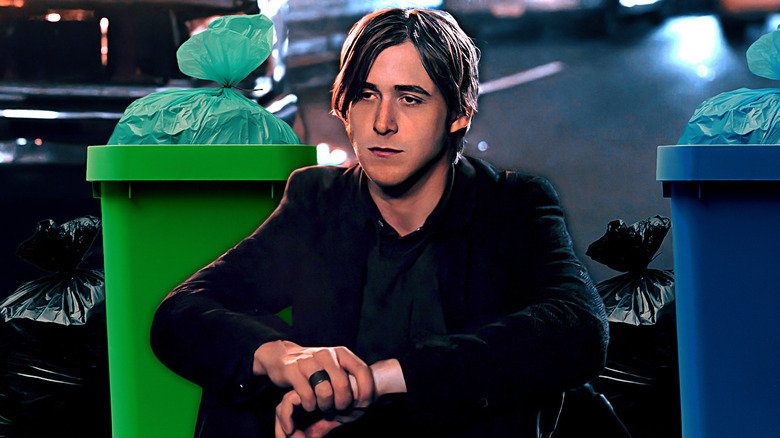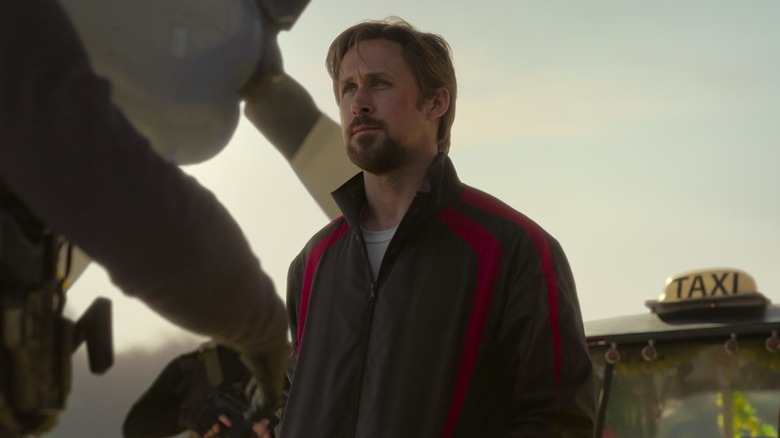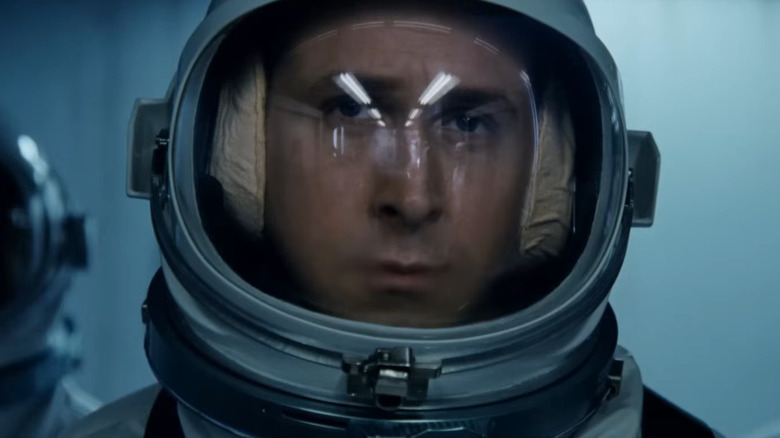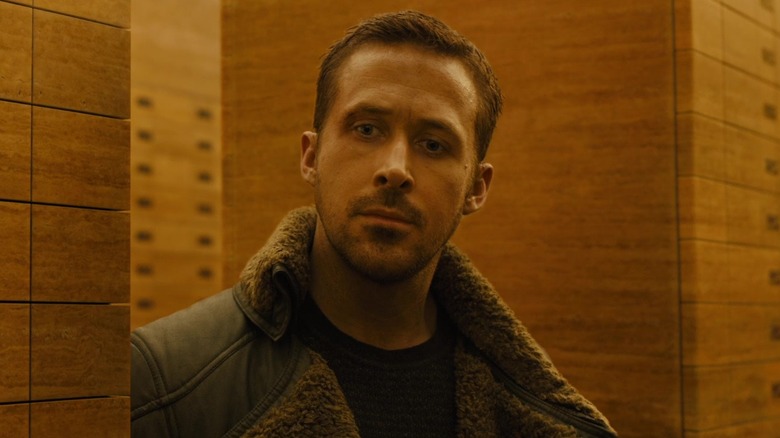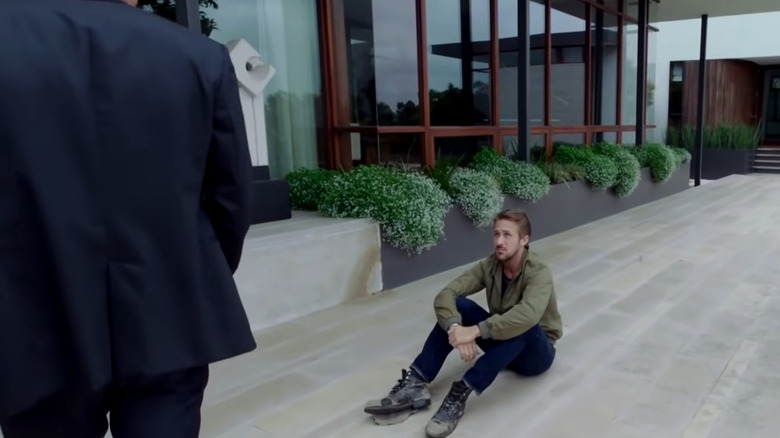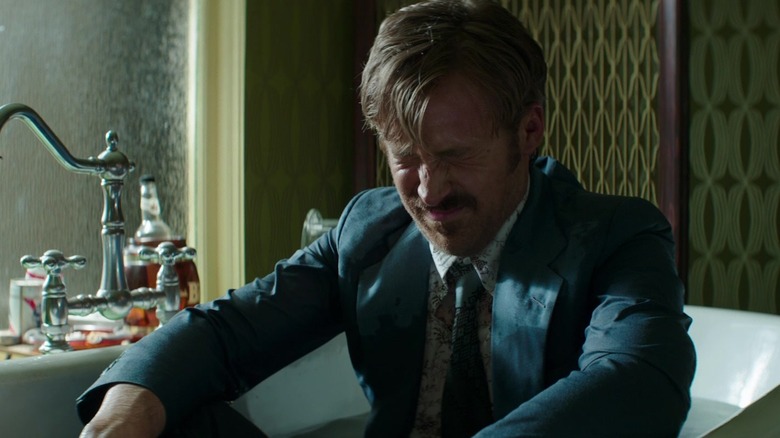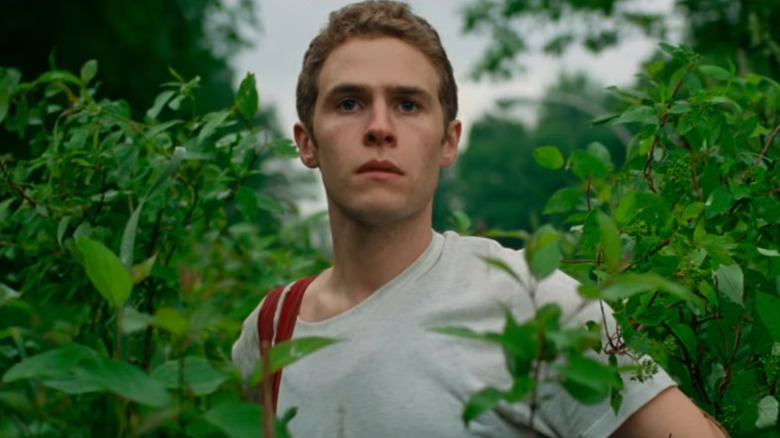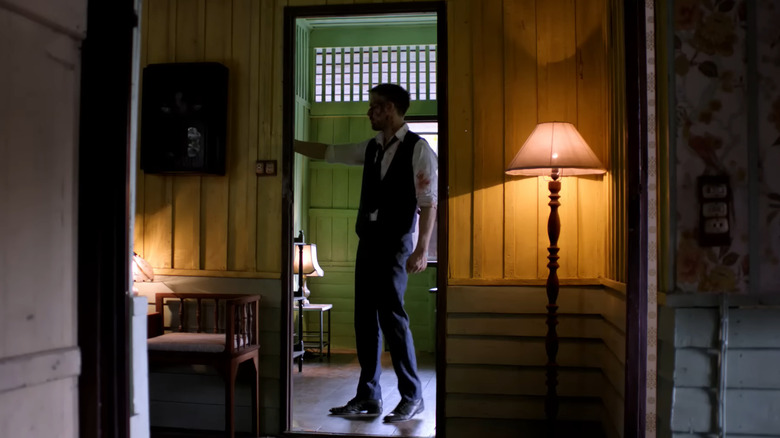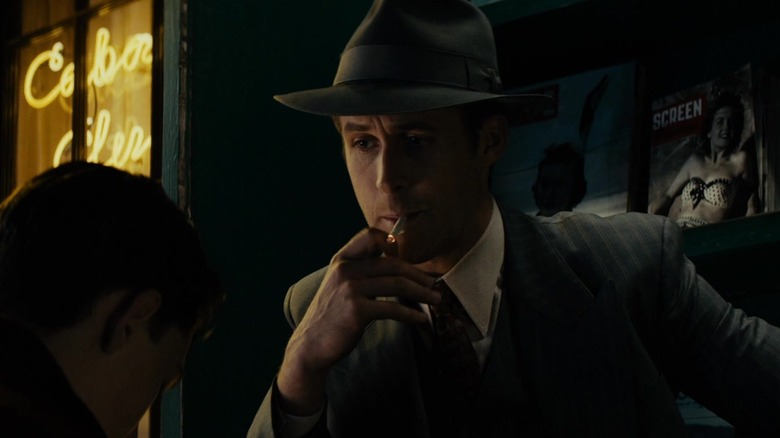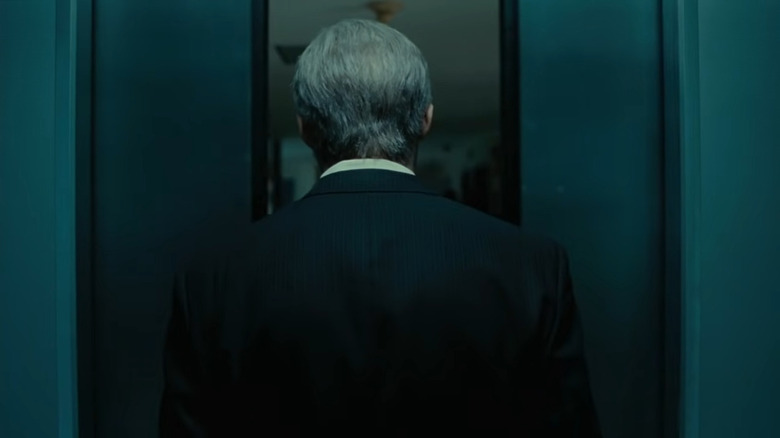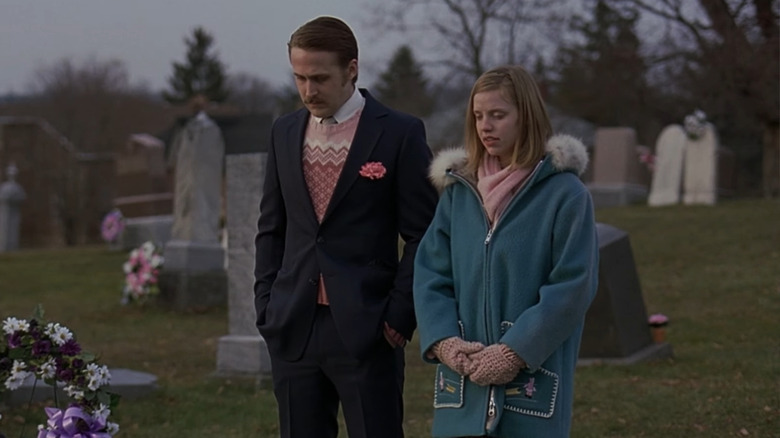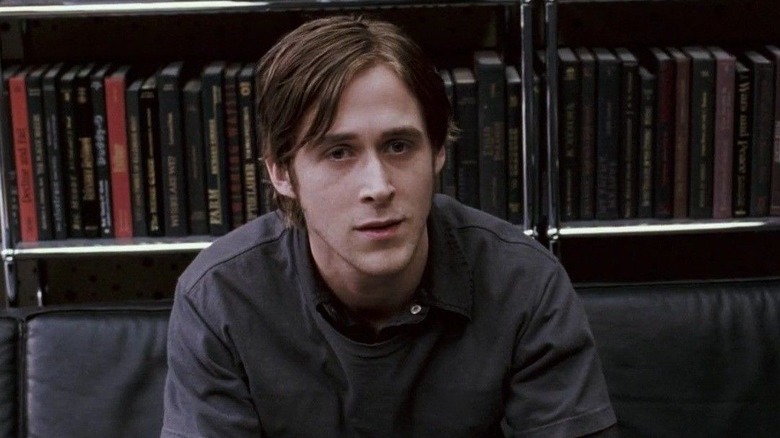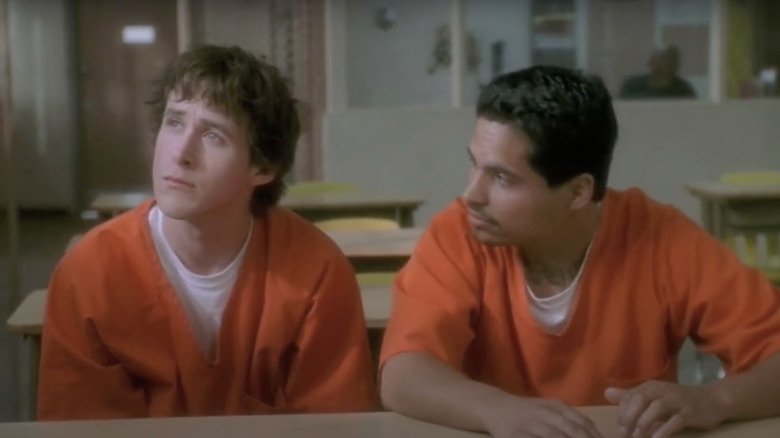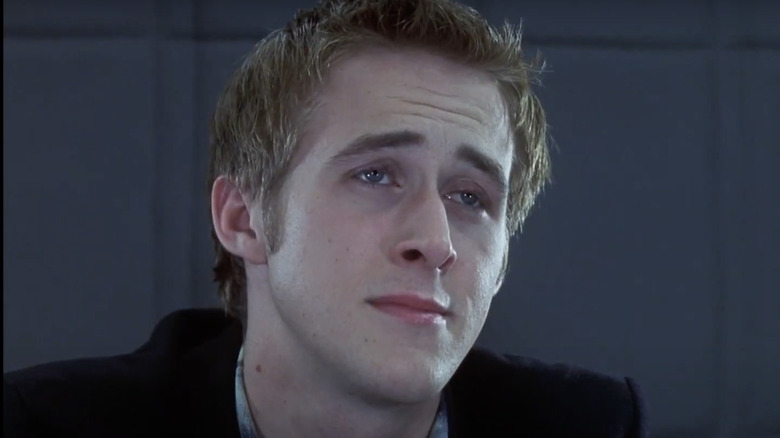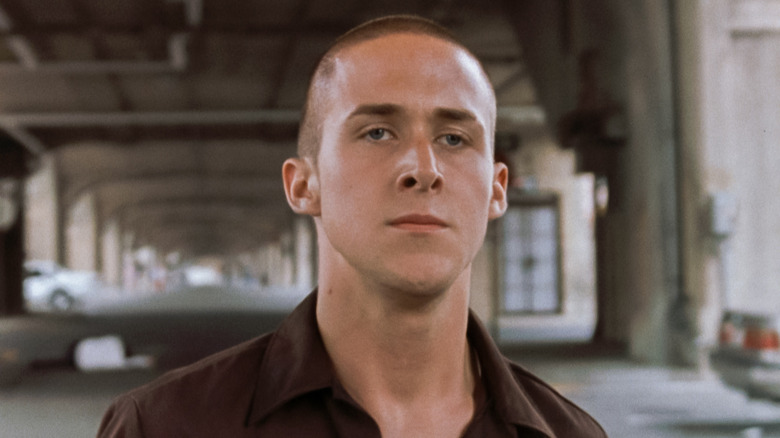The Forgotten Failures Of Ryan Gosling
Is there anyone more beloved in Hollywood right now than Ryan Gosling? The 43-year-old Canadian actor has had a truly awe-inspiring career in the decades since he burst into the entertainment industry on Disney's "The Mickey Mouse Club" as a young artist. From his entrancingly broody turn in the tense thriller "Drive" to his implacably Kenergetic (and Oscar-nominated) performance in Greta Gerwig's "Barbie," it's hard to imagine any of his peers not harboring at least a little jealousy for his uniquely eclectic body of work. Indeed, Gosling has made home runs out of an enviable number of big swings in his career — but many of those swings also resulted in equally large misses.
While it's easy to get overpowered by his dreamy song-and-dance in "La La Land," Gosling's actual journey to artistic success was somehow far more volatile than that of his tap-dancing counterpart. For every "sublime" high, there remains some wince-inducing low lingering on his resume. As we enjoy Gosling taking a beating in the trailer for his upcoming film "The Fall Guy" – waiting with bated breath to see whether or not it will be another explosive success or leave his career equally bruised — we've taken a look at some of his critical and commercial failures throughout his tenure as Hollywood's favorite heartthrob.
The Gray Man
On paper, an action thriller starring Ryan Gosling opposite the equally charming Chris Evans seems like an absolute win. This is especially true when you add in directors Joe and Anthony Russo and writers Christopher Markus and Stephen McFeely — the team behind some of the best films in the Marvel Cinematic Universe. Yet "The Gray Man" wound up being a perplexingly dull exercise in exploring the limits of franchise filmmaking when stripped of recognizable characters.
It landed on Netflix in 2022, receiving mixed-to-negative reviews from critics (Rotten Tomatoes indicated that 45% of reviews were positive, while the average review score at Metacritic was 49/100). Most reviewers found it to be bland if occasionally punchy, though many noted its cast wasn't necessarily to blame. In a 2-out-of-4 star review, RogerEbert.com acknowledged their "incredible screen presence" and charisma, while NPR conceded that Gosling and Evans were "an effective matched set." However, The New York Times wrote that the film failed to explore the potential complexities of Gosling's character, and that the staging of some action sequences left one to wonder whether or not the directors had faith in Gosling's ability to perform his own stunts.
Despite this, "The Gray Man" does have its fans, many of whom apparently spent a staggering amount of time watching it on Netflix. If you're a Gosling fan looking to watch him throw hands, you're still likely better off checking out "Drive" — or the end of "Barbie," for that matter.
First Man
From "The Gray Man" to "First Man": another idea that sounds excellent on paper is a reunion between Ryan Gosling and "La La Land" director Damien Chazelle. The difference in this case is that the latter film — a biopic about the legendary astronaut Neil Armstrong — actually garnered favorable reviews from the critical community and became a serious contender during the 2018-2019 awards season. So why is this film still one of Gosling's biggest failures? Because, for an Oscar-worthy reunion of a bankable Hollywood star and a director quickly on the rise, "First Man" surprisingly didn't take off at the box office.
There are plenty of reasons why "First Man" bombed, key among them that it was released against hits like "Venom" and "A Star Is Born." In hindsight, it arguably shouldn't have been too shocking that a Marvel film with an A-list leading man and a film starring a contemporary music icon with a devoted fan base would fare better financially than an artsy space-age drama. Although Universal's President of Domestic Distribution Jim Orr projected confidence over the film's underwhelming debut – claiming their target audience of adult males would hold its performance steady over several weeks — "First Man" ultimately made just $105 million worldwide against a lofty budget of nearly $80 million.
Blade Runner 2049
Ryan Gosling has experienced more than his fair share of arguably undeserved box office bombs, but perhaps none are more pronounced than "Blade Runner 2049," Denis Villeneuve's ambitious sequel to the classic Harrison Ford film that somehow managed to transcend even the highest expectations of longtime fans — yet still failed to deliver against a daunting production budget of between $150-$185 million.
Acclaimed director Ridley Scott, who helmed the first "Blade Runner" in 1982 and served as an executive producer on Villeneuve's sequel, told Al Arabiya that the length of "2049" was largely to blame for its disappointing run. "It's slow," he told the outlet. "Long. Too long. I would have taken out half an hour." Though length and pacing are sound criticisms, they would better explain any negative reviews rather than why people chose not to even make the effort to see the film in theaters, despite critics being largely positive about the film.
For their part, Villeneuve and Warner Bros. chalked the poor performance up to the smaller-than-expected "Blade Runner" fanbase (which WB specifically admitted to having overestimated). There were also concerns about the film's vague marketing campaign, which relied on the admittedly gorgeous visuals and tone that Villeneuve captured rather than what the film had to offer in terms of story.
Song to Song
What if we told you there was a film out there that starred not just Ryan Gosling, but fellow Academy Award nominees Michael Fassbender, Rooney Mara, Natalie Portman, and Cate Blanchett? You might be a bit shocked — surely any one of our readers would have heard of a movie with so much star power that it arguably rivals "Oppenheimer." One more name, however, would probably make all this confusion go away rather quickly: Terrence Malick.
As a director and writer, Malick's work is not the least bit conventional. His films are rarely paced like one might expect, are almost unanimously experimental, and overall have little concern for placating the demands of commercial filmmaking. In other words, for those familiar with Malick's style, it isn't surprising that 2017's "Song to Song" was neither critically nor commercially successful. Like his other films, Malick's somber and exploratory tale of unfaithful artists trying to find meaning in their lives almost defies critical comparison, and was likely never expected to draw the same crowds as other star-studded dramas.
It's hard then to classify this as a true "failure," even though it did objectively fail to make a positive impression among a majority of critics or audiences, and made less than $2 million worldwide. Given the autonomy Malick had, one would imagine he succeeded in whatever goal he was attempting to accomplish with "Song to Song."
The Nice Guys
Yet another certified Ryan Gosling classic that dramatically underperformed at the box office, "The Nice Guys" is one of many 2010s bombs that's actually worth watching. In fact, if we had to recommend any film on this list to any of our viewers, it would be this one. "Blade Runner 2049" and "First Man," as great as they are, have a significantly narrower target audience than this smart, stupefyingly hilarious buddy-cop action-comedy, which features a strangely perfect duo in Gosling and co-star Russell Crowe.
Based on the critical reviews they obtained, Metacritic awarded "The Nice Guys" a "generally favorable" score of 70/100, while Rotten Tomatoes posted that 91% of critics gave the film a positive review. Both sites also indicate a positive reception from general audiences. To date, it's by some metrics "Iron Man 3" writer-director Shane Black's greatest cinematic achievement. Unfortunately for him and Gosling, however, it made about $71 million worldwide against a budget of $50 million.
Lost River
If you ask critics and audiences – the few who have actually seen 2014's "Lost River," that is — for their opinion on the film, they'll likely tell you there's nothing incredibly special about it. Except, of course, that it was the first and (for now) last film written and directed by Ryan Gosling.
Chances are, you've probably never heard of "Lost River," and might have been entirely unaware that Gosling once stepped behind the camera for an ambitiously surreal film starring a whole host of recognizable names (Christina Hendricks, Saoirse Ronan, and Matt Smith to name a few). In spite of the cast and an audacious story (that starts with a single mother raising two children and ends with, we kid you not, Ben Mendelsohn executing one of the creepiest dance sequences ever put on tape) the film failed to break out of the festival circuit and made a total of just $615,500.
Still, there's an argument to be made that if "Lost River" were released today — when weird A24 films like "Beau is Afraid" are able to make their mark — Gosling's work might have found a larger audience, especially if you take his current level of fame into account.
Only God Forgives
Fans of Ryan Gosling's work in "Drive" might be delighted to learn that he collaborated with director Nicolas Winding Refn on a second film: 2013's "Only God Forgives." They might be slightly less delighted, however, when they see how it was torn to shreds by critics upon its release, before slinking out of theaters with a shrug-worthy $10.6 million haul.
At the time, the film was largely notable for an apparently unfathomable level of violence (which includes a scene that involves Gosling's character inserting his hand into the womb of his dead mother – allegedly a dramatic beat Gosling conceived of on his own). Time Out compared the story to that of a "straight-to-DVD B-movie," while adding that thanks to a rather sleepy performance, "it's Gosling who comes out the worst." It does have its defenders among the critical community, with The Guardian in particular giving the film 5-out-of-5 stars upon release and publishing a lengthy defense of it in 2021.
Gangster Squad
Though they're best known for dancing through Los Angeles together in "La La Land," Ryan Gosling and Emma Stone had actually already collaborated twice before at that point. In 2011, the pair played love interests in the successful modern ensemble farce "Crazy, Stupid, Love," which also starred Steve Carell, drew mostly positive reviews, and grossed a very fair $145 million.
Shortly afterward, however, Stone and Gosling reunited under less auspicious circumstances for the mob thriller "Gangster Squad." Directed by Ruben Fleischer (best known at the time for directing "Zombieland"), "Gangster Squad" was dumped into theaters in January 2013 and made just over $105 million against a $60 million budget – a budget which seems to suggest that Warner Bros. expected Fleischer, Gosling, Stone, and the rest of the top-shelf talent on board to deliver a massive hit. To make matters worse, "Gangster Squad" also received largely negative reviews from critics, who generally felt that it used mind-numbing violence to distract from a flat and uninteresting script.
All Good Things
Every film on this list has at least a handful of apologists claiming that they aren't nearly as bad as critics let on. That's all fine and good. But you know what no other film but "All Good Things" has going for it? It actually helped solve one of the most infamous murder mysteries of the 20th century.
In "All Good Things" (a critical and commercial flop that debuted in 2010), Gosling plays David Marks, a would-be Manhattan real estate heir who becomes increasingly erratic, to the point that he potentially murders three different people — including his wife (Kirsten Dunst) and his best friend (Lily Rabe). The film was so clearly based on the real-life case of Robert Durst — the late Manhattan real estate heir connected to the alleged deaths of three people — that Durst himself called director Andrew Jarecki and agreed to be interviewed.
To make a very long story short, their interactions led to the production of the HBO docuseries "The Jinx," during which Jarecki and his crew managed to uncover evidence that would eventually see Durst convicted of murdering his best friend, Susan Berman. Shortly after his trial, he died of natural causes.
Lars and the Real Girl
As beloved as "Barbie" was, there are probably more than a few cinephiles out there who feel it was only the second-best film about Ryan Gosling falling desperately in love with a doll. The 2007 dramedy "Lars and the Real Girl" (directed by Craig Gillespie, who later helmed "I, Tonya" and "Cruella") stars Gosling as the titular character, an awkward and socially isolated young man who develops a relationship with a life-like doll he orders from an adult online shop. In order to support him through his struggles with the underlying issues of his delusion, Lars' family and friends pretend the doll is real.
"Lars and the Real Girl" received largely positive reviews upon its release, with writer Nancy Oliver even netting an Academy Award nomination for Best Original Screenplay (she ultimately lost to Diablo Cody for "Juno"). But, as you might have guessed at this point, it's yet another great Gosling film that barely registered at the box office, grossing less than $11.3 million against a budget of $12 million. Suffice it to say, there won't be any "Lars and the Real Girl" sequels anytime soon — unless, of course, you count "Barbie."
Stay
By some standards the worst film Ryan Gosling has ever appeared in, there isn't much nice to say about 2005's "Stay." This bewilderingly convoluted and often confounding psychological drama follows a psychiatrist (Ewan McGregor) who becomes obsessed with preventing the death of one of his patients (Naomi Watts). Gosling plays Henry, an artist and college student involved in a car crash who has a mysterious connection to the psychiatrist. "Stay" debuted to overwhelmingly negative reviews, which mostly criticized its apparently aimless yet overwrought plotting that bordered on pretentious for many.
All this being said, it has garnered somewhat of a cult following over the years, particularly among those who enjoy tense and complicated films like those of David Lynch (though a direct comparison still feels undeserved here). It is also often praised by fans for its cerebral storytelling and passionate performances, and is even regarded by some as one of Gosling's most underrated films to date.
The United States of Leland
"The United States of Leland" tells the story of a boy (Ryan Gosling) who is imprisoned in a juvenile detention facility after taking the life of another child. While inside, he ingratiates himself with a teacher (Don Cheadle), who in turn recognizes some human depth within the boy and bends certain rules in order to give him a more comfortable life. As such dramas go, many tragic and emotionally cathartic events ensue, and everyone in the audience leaves the theater in a more pensive, if not worse, mood than when they got there.
If its depressing storyline were any indication, 2003's "The United States of Leland" performed terribly both critically and commercially. More surprising is that, in spite of a fairly impressive cast of actors less than a decade away from their respective career peaks, reviews for the film consistently pointed out the performances among the film's key issues.
Murder by Numbers
"All Good Things" wasn't Ryan Gosling's first chance to play a dramatized version of a real-life murderer. In 2002, he played high school killer Richard Haywood in the Sandra Bullock crime thriller "Murder by Numbers." In the film, Gosling's character and another student (played by "Hannibal" star Michael Pitt) abduct and murder a woman before attempting to frame an innocent man for the deed.
If this sounds vaguely familiar, it might be because "Murder by Numbers" is a fictionalized reimagining of the horrifying crime executed by Nathan Leopold and Richard Loeb, two college students who brutally murdered a 14-year-old boy named Bobby Franks in 1924. (Or it might just be because the story resembles any of the several films loosely based on the murder).
Unfortunately, its arguably outsized $50 million budget made financial success a tough task, and critical success wasn't easy to come by either. Critics didn't find the film to be quite as complex or shocking as the real case, and it has since been forgotten in the large pile of bargain-bin thrillers that chased the successes of "The Silence of the Lambs" and "Seven."
The Believer
Finally, we come to "The Believer," a film which provided Ryan Gosling with one of his earliest and arguably most challenging starring roles, as well as his first critical-hit-commercial-failure combo. Unlike "The Nice Guys" and "Lars and the Real Girl," however, we have to warn you that this film is far more difficult to watch and far darker in terms of its subject matter.
"The Believer" follows the story of Danny (Gosling), a fictionalized version of the real-life neo-Nazi Dan Burros. In 1965, a New York Times exposé revealed that Burros was actually Jewish, despite having relentlessly and genuinely advocated for violence against Jewish people (in the real world, Burros died by suicide soon after the article was published, though the narrative of "The Believer" deviates from reality significantly). The film made $1.3 million against a budget of $1.5 million, failing to recoup its cost by a significant margin.
